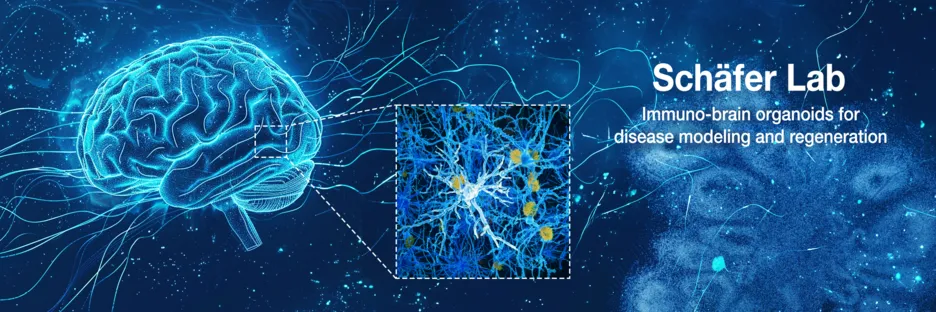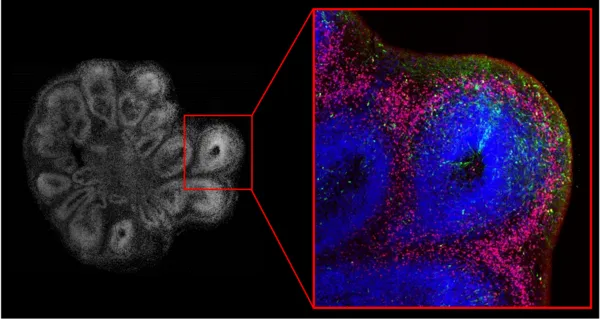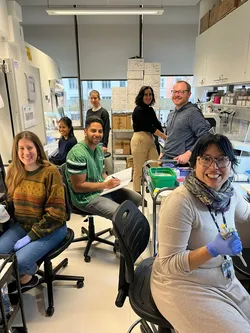
Engineering advanced Organoid Systems to Study Human Brain Development, Disease and Repair - the Schafer Lab focuses on advancing novel stem cell-based technologies to push the boundaries for personalized research on human-specific brain disorders and to identify strategies for facilitating brain repair.
Studying prenatal human brain development remains a challenge due to limited access to live human brain tissue and ethical constraints on research using human embryos. Recent advances in stem cell biology have revolutionized the field of human developmental biology by allowing us to generate three-dimensional models that recapitulate structural organization of various organs, including the brain.
The Schafer Lab leverages cutting-edge technologies in developmental biology, direct lineage programming, gene editing and bioengineering to explore new ways for generating complex human brain tissue and disease models. The overarching goal of our research is to gain novel insights into human biology and to develop new, personalized therapies for brain disorders and tissue repair.
Prof. Dr. Simon Schäfer
Irene Santisteban Ortiz, PhD Student
Janina Kaspar, PhD Student
Lucia Rodriguez, PhD Student
Lisa Mitchell, associated PhD Student
Monique Pena Schafer, Lab Manager and Staff Scientist
Zuhdi Ahmad, MSc Student
Long interspersed nuclear elements safeguard neural progenitors from precocious differentiation. Toda, T.*, Bedrosian, T. A.*, Schafer S.T.*, Cuoco, M. S., Linker, S. B., Ghassemzadeh, S., Mitchell, L., Whiteley, J. T., Novaresi, N., McDonald, A. H., Gallina, I. S., Yoon, H., Hester, M. E., Pena, M., Lim, C., Suljic, E., Mansour, A. A., Boulard, M., Parylak, S. L. & Gage, F. H. Cell Reports (2024) *equal contribution
An in vivo neuroimmune organoid model to study human microglia phenotypes. Schafer S.T.*#, Mansour A.A.*, Schlachetzki J.C.M., Pena M., Ghassemzadeh S., Mitchell L., Mar A., Quang D., Stumpf S., Santisteban Ortiz I., Lana A.J., Baek C., Zaghal R., Glass C.K., Nimmerjahn A., Gage F.H. Cell (2023) *equal contribution, #lead contact
Age-dependent instability of mature neuronal fate in induced neurons from Alzheimer’s patients. Mertens, J.*#, Herdy, J. R.*, Traxler, L.*, Schafer, S.T., Schlachetzki, J. C. M., Böhnke, L., Reid, D. A., Lee, H., Zangwill, D., Fernandes, D. P., Agarwal, R. K., Lucciola, R., Zhou-Yang, L., Karbacher, L., Edenhofer, F., Stern, S., Horvath, S., Paquola, A. C. M., Glass, C. K., Yuan, S. H., Ku, M., Szücs, A., Goldstein, L. S. B., Galasko, D. & Gage, F. H.# Cell Stem Cell (2021) *equal contribution, #corresponding authors
Zika Virus Targets Glioblastoma Stem Cells through a SOX2-Integrin αvβ5 Axis. Zhu, Z.*, Mesci, P.*, Bernatchez, J.A., Gimple, R.C., Wang, X., Schafer, S.T., Wettersten, H.I., Beck, S., Clark, A.E., Wu, Q., Prager, B.C., Kim, L.J.Y., Dhanwani, R., Sharma, S., Garancher, A., Weis, S.M., Mack, S.C., Negraes, P.C., Trujillo, C.A., Penalva, L.O., Feng, J., Lan, Z., Zhang, R., Wessel, A.W., Dhawan, S., Diamond, M.S., Chen, C.C., Wechsler-Reya, R.J., Gage, F.H., Hu, H., Siqueira-Neto, J.L., Muotri, A.R., Cheresh, D.A., Rich, J.N. Cell Stem Cell (2020) *equal contribution
Pathological priming causes developmental gene network heterochronicity in autistic subject-derived neurons. Schafer, S.T., Paquola, A.C.M., Stern, S., Gosselin, D., Ku, M., Pena, M., Kuret, T.J.M., Liyanage, M., Mansour, A.A., Jaeger, B.N., Marchetto, M.C., Glass, C.K., Mertens, J. & Gage, F.H. Nature Neuroscience (2019)
Chemical modulation of transcriptionally enriched signaling pathways to optimize the conversion of fibroblasts into neurons. Herdy, J., Schafer, S.T., Kim, Y., Ansari, Z., Zangwill, D., Ku, M., Paquola, A., Lee, H., Mertens, J.# & Gage, F.H.# eLife (2019) #corresponding authors
The Wnt Adaptor Protein ATP6AP2 Regulates Multiple Stages of Adult Hippocampal Neurogenesis. Schafer, S.T., Han, J., Pena, M., von Bohlen und Halbach, O., Peters, J.# & Gage, F. H.# Journal of Neuroscience (2015) #corresponding authors
Functional Implications of miR-19 in the Migration of Newborn Neurons in the Adult Brain. Han, J.#, Kim, H.J.*, Schafer, S.T. *, Paquola, A., Clemenson, G.D., Toda, T., Oh, J., Pankonin, A.R., Lee, B.S., Johnston, S.T., Sarkar, A., Denli, A.M. & Gage, F.H.# Neuron (2016) *equal contribution, #corresponding authors
Differential responses to lithium in hyperexcitable neurons from patients with bipolar disorde. Mertens, J.*, Wang, Q.W.*, Kim, Y., Yu, D.X., Pham, S., Yang, B., Zheng, Y., Diffenderfer, K. E., Zhang, J., Soltani, S., Eames, T., Schafer, S.T., Boyer, L., Marchetto, M.C., Nurnberger, J.I., Calabrese, J.R., Oedegaard, K.J., McCarthy, M.J., Zandi, P.P., Alda, M., Nievergelt, C.M., Mi, S., Brennand, K.J., Kelsoe, J.R.#, Gage, F.H.# & Yao, J.# Nature (2015) *equal contribution, #corresponding authors
Reviews & Highlights
Transplantation strategies to enhance maturity and cellular complexity in brain organoids. Wang M, Gage, F.H. & Schafer, S.T.# Biological Psychiatry (2023) #corresponding author
The When and Where: Molecular and Cellular Convergence in Autism. Schafer, S.T. & Gage F.H. Biological Psychiatry (2021)
Cellular complexity in brain organoids: Current progress and unsolved issues. Mansour, A.A.*, Schafer, S.T.* & Gage F.H Semin. Cell Dev. Biol (2020) *equal contribution
Nerve cells from the brain invade prostate tumours. Schafer, S.T. & Gage F.H. Nature (2019)
Adult Neurogenesis in the Hippocampus: From Stem Cells to Behavior. Gonçalves, J.T.*, Schafer, S.T.* & Gage, F.H Cell (2016) *equal contribution
Full publication list: Google Scholar
Deutsche Forschungsgemeinschaft (DFG)
Brain & Behavior Research Foundation (BBRF)
Schäfer Lab
COS@TranslaTUM
Einsteinstr. 25
81675 Munich
Germany
simon.schafer(at)tum.de

